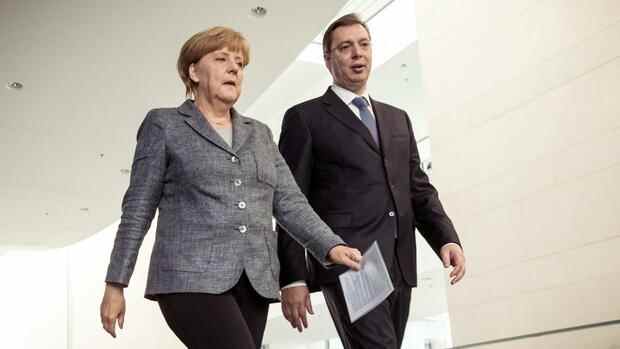Integrating the Western Balkans into the international community is of central geopolitical importance for the EU.
(Photo: dpa)
Brussels The farewell is imminent: On Monday, Chancellor Angela Merkel (CDU) is traveling to the Western Balkans – to meet one last time the heads of government of those six countries that hope to join the EU in the not too distant future: Serbia, Montenegro, North Macedonia , Albania, Kosovo and Bosnia-Herzegovina.
It all starts with a meeting between Merkel and the Serbian President Aleksandar Vučić in Belgrade. On Tuesday the trip continues to Albania, where the Chancellor will meet Albanian Prime Minister Edi Rama for bilateral talks. This is followed by a joint round of talks with all heads of government from the six countries.
The end of the Merkel era is bitter for the capitals of the Western Balkans: They are losing an important advocate in the European Union and are threatening to remain in a waiting position for even longer than they have already been.
Because with France, one of the most powerful EU member states is blocking progress in the accession process and repeatedly attracting other member states to its side. With Merkel as a counterpart and influential conjurer of France, the Western Balkan countries still hoped that their EU integration would go ahead. Indeed, progress has been made.
Top jobs of the day
Find the best jobs now and
be notified by email.
It is now uncertain whether the next German government will succeed in influencing French President Emmanuel Macron and other EU countries to the same extent as Merkel, who are happy to make use of their right of veto on the enlargement issue. When the Chancellor candidates Armin Laschet (CDU) and Olaf Scholz (SPD) visited Macron in Paris last Wednesday and Monday, respectively, the EU integration of the Balkans was not an issue.
Tough negotiations, permanent blockades
Brussels is currently only negotiating concretely with Serbia and Montenegro about accession to the EU, which will continue for a few years. In the case of Albania and North Macedonia, the member states decided last year to open accession negotiations, but nothing has happened. The reason: Bulgaria vetoed it.
The dispute with Greece dragged on for decades.
(Photo: dpa)
Sofia argues with Skopje about the partly shared history and does not want to recognize “North Macedonian” as its own language, as it is a Bulgarian dialect. In addition, North Macedonia should only be allowed to call itself the “Republic of North Macedonia”, since the term “North Macedonia” could also mean the northern part of the geographical region of Macedonia, which in turn belongs partly to Bulgaria.
This is another low blow for North Macedonia. More than 15 years ago, the EU Commission recommended that the member states negotiate with Skopje about joining the EU.
But even then, the name of the country was a problem. For years, Greece blocked the start of accession negotiations due to the name “Macedonia”, as North Macedonia called itself until the beginning of 2019. Precisely because of the geographical region of Macedonia, which is largely located in Greece. North Macedonia had no choice but to rename itself.
Merkel in Poland: laying a wreath at the Tomb of the Unknown Soldier
When Athens finally withdrew its veto, the blockade from France followed. The official reason was that the accession process had to be reformed first. The unofficial one: the fear of growing EU skepticism in one’s own country.
Only a proposal by the EU Commission on a reform of the accession procedure (which, however, did not contain any real changes) and compromise chatters with Germany ensured that Paris gave in. However, to this day France is still a country skeptical of enlargement, which for its part is not even trying to find a solution to the Bulgaria blockade – unlike Germany under Merkel.
Integrating the Western Balkans into the community of states is actually of central geopolitical importance for the EU. Other world political powers such as Russia, China or the Gulf states are happy to take advantage of the hesitant approach of the EU capitals to expand their influence in the region and to sow EU skepticism.
More: Montenegro wants to be a member of the EU by 2025
.
